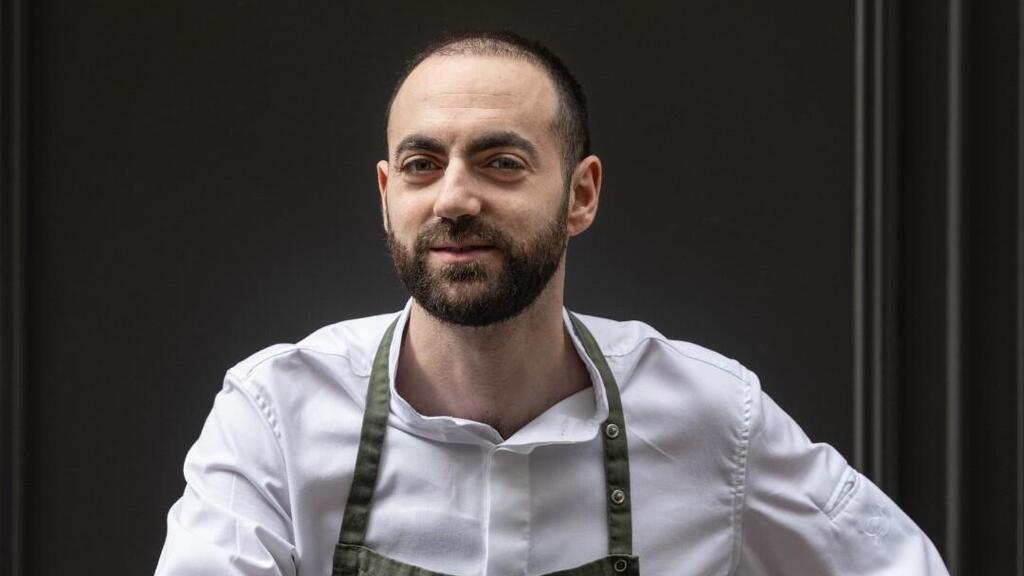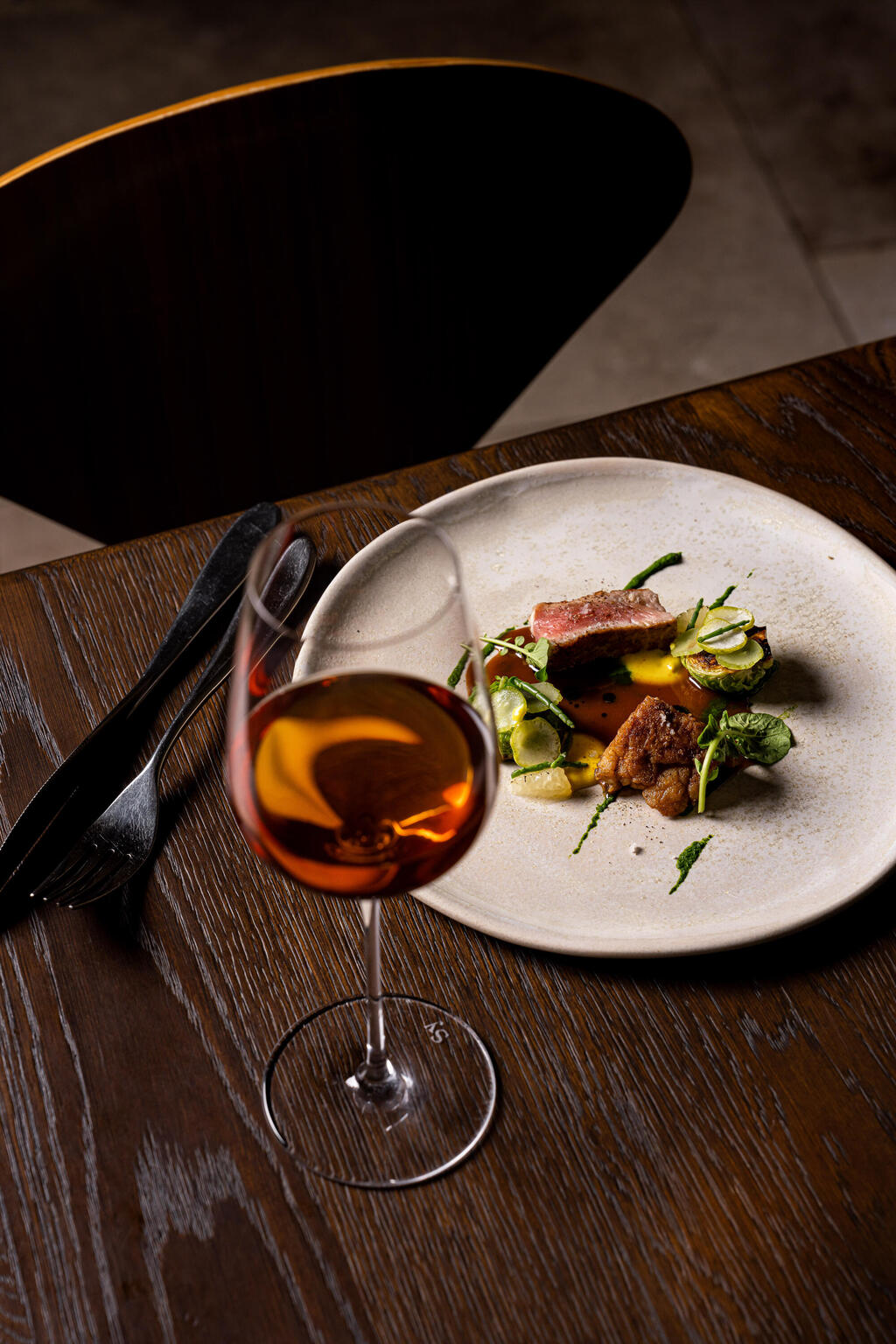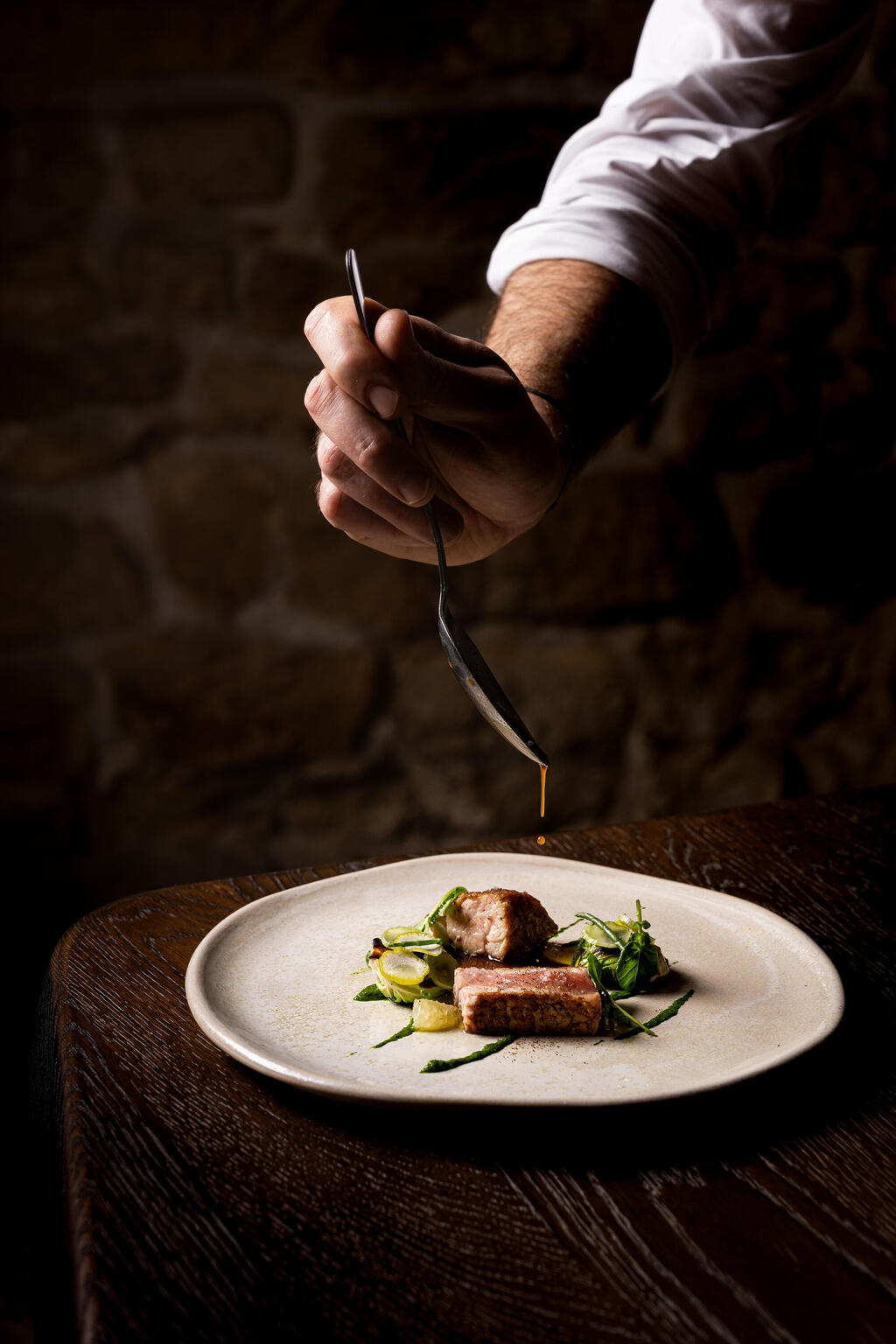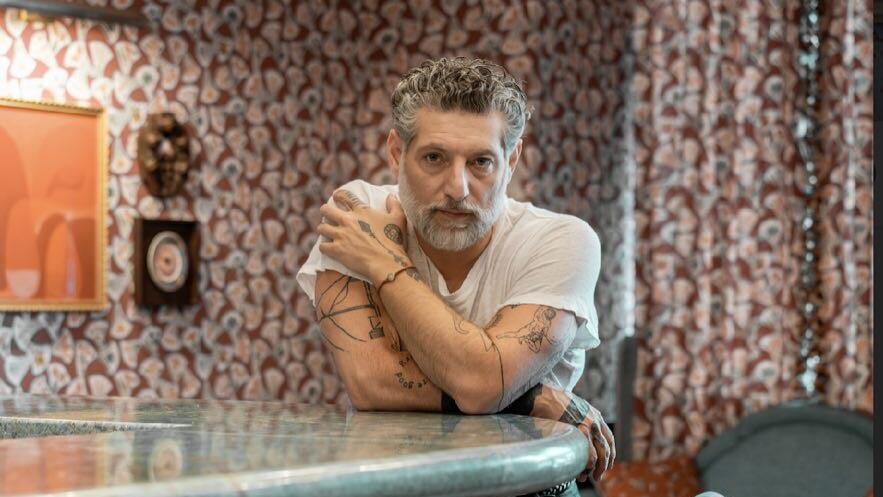Israeli chef Matan Zaken received a Michelin star this week for his Paris restaurant in Nhome, and currently holds the title of the youngest Israeli chef to receive the coveted culinary ranking alongside other older Israeli chefs like Assaf Granit.
5 View gallery


Matan Zaken is the youngest Israeli chef ever to receive a Michelin star
(Photo: makimanoukian)
Zaken, 31, was born in Jerusalem to a French mother and an Israeli father of Kurdish origin. He spent his childhood in Jerusalem’s Katamon neighborhood, where his grandmother still resides. When he was 12, his family left the country and settled in an apartment in southern France.
There, Zaken studied culinary arts and, at the age of 15, trained in the kitchen of a Michelin-starred restaurant. At the age of 19, he decided to return to Israel alone and enlist in the IDF. He served in the Golani Brigade as a lone soldier, and says about the period: "It was one of the toughest challenges I've had in my life. It was during Operation Protective Edge, and I was with my unit in Gaza. There were some very meaningful moments for me there."
After being discharged from the military, he returned to France and decided that in order to learn more about food he had to work in restaurants with Michelin stars. He moved to London and worked in a three-star restaurant. After a year, he returned to Paris and, using his experience, managed to join the kitchen of Le George, a three-Michelin-starred restaurant located in the luxurious George V Hotel from the Four Seasons group.
But then, five years ago, he decided to stop working for others and started cooking private meals for customers, until he opened Nhome in Paris’s first arrondissement, not far from the Louvre Museum. Zaken serves a tasting menu consisting of nine courses, to which seven different wines can be matched. The price: 115 euro per diner, excluding wine.
The idea that stood before Zaken's eyes was to try and break the format of traditional cuisine, which is so characteristic of the City of Lights. In Nhome, all guests eat at one large chef's table and share the evening with strangers.
To Israelis, this arrangement may sound quite normal, but it’s important to understand that Paris, the capital of world cuisine, is a city that cherishes traditional culinary culture, and has only begun to develop new and bold ideas that depart from the familiar in recent years, following Granit’s restaurants, after he arrived and broke the rules of the game in terms of service, atmosphere and music.
At Nhome restaurant, each guest eats dishes that were prepared for them - and they don’t know what they are beforehand. Zaken's menu changes according to the seasons, the products and "according to my mood," as he defines it. Every evening, a team of 10 chefs cooks for 24 people. No white tablecloths cover the tables, and the seats are arranged at different heights.
"People in Paris don't know this style," Zaken explains. "We connected four tables together and, eventually, a strange table format was accepted where the tables aren’t at the same height. It psychologically separates people, but they still sit together. The French audience isn’t used to this, and the Michelin inspectors even less so. Paris is the city of the Michelin Guide; they say it's the hardest place in the world to win a star."
Why exactly?
"Because there are many young talented chefs here with experience, skills and a resume who invest a lot of money and open a restaurant. Entering this competition in the world’s most gastronomic city with a concept as bizarre as mine is a challenge. It's not about doing things as they should be, but precisely because of that, I feel even prouder because I succeeded with something that’s uniquely mine," he said.
“The chefs in my restaurant serve guests; they both cook and serve the food and explain to the guests what's on the plate. They’re the ones who worked many hours to prepare it, and they’re the ones who know what's in the dish the best. This builds trust between the diners and the chefs, and it brings people into the experience," he explained.
By the way, does your grandmother's kubbeh appear on the menu?
"I can't make kubbeh because no matter how many stars I have, I’ll never achieve the taste of my grandmother's food. And overall, I don't want to categorize my food into a specific country or style.
“There are Israeli spices that speak to me. For example, one of our flagship dishes is a dish of calf sweetbreads with amba, but it's just an Israeli touch and not Israeli food per se. I can't call myself an Israeli restaurant, but we do have a dish of oysters with sumac, pomegranates and finger lime, and there are dishes that aren’t Israeli at all."
Wait, where does the sumac come from?
"From Israel, from the Carmel Market. Every friend who travels to Israel must come back with spice bags for me. That's how I place my orders."
Okay, so there isn’t Israeli food, but what about Israeli wines?
"I know there’s good wine in Israel, but the truth is we don't have Israeli wines on the menu. The wine list mainly focuses on France, where you can find the best wine in the world. There’s some Italian, Spanish and even Californian wine, and our goal is to find the best wine for the food."
You're operating the business on your own, with partners, and no big-name team behind you. Where do you get the courage to do that?
"I worked for many years, and I planned to open my own restaurant one day. In the five years during which I held private events, I knew that the money I earned was only intended for opening my restaurant. It's a dream come true and now, with the Michelin star, this dream is even bigger. I have no public relations office and I don’t have a clique here."
Why was it important for you to work in Michelin-starred restaurants?
"No matter where you want to end up eventually, what matters is that you go to work in prestigious and upscale restaurants with top-notch food because it gives you the most experience. I wanted to work with the best to learn the most. Last night at the Michelin ceremony, I went on stage to receive the star, and my chef at Le George embraced me there on stage and praised me. He's a three-star chef who taught me everything."
Michelin is facing criticism that calls it an outdated institution that has lost its relevance.
"About 15 years ago, the Michelin Guide did lose some of its popularity, but in recent years it has managed to regain its relevance. My restaurant is trendy, and it's a good example of the turnaround they made with Michelin. In my restaurant, there are no menus on the table, and the waiters don't wear uniforms and aprons, and there's music.
“In recent years, Michelin has stepped out of its rigid template, and is willing to accept experimental things too. Five years ago, no one would’ve even looked at me because my restaurant was weird. But the criteria have changed because what people are looking for has also changed. People want to settle in a place and feel comfortable. A few years ago, you wouldn’t be allowed to enter a Michelin restaurant without wearing a suit.
“Today, there are a few places that still insist on that, but they’re few, it doesn't happen anymore. People want a different experience, so Michelin understood that they also need to think differently. Even Assaf Granit's Shabour isn’t a classic Michelin restaurant, you also eat at the bar next to the kitchen there, and there are no menus – but there’s an atmosphere, that's what's important today."
Did you eat at one of Granit's restaurants? He has five restaurants in the city now.
"Not yet, but we met the other day at the Michelin ceremony and shook hands. His team ate at my place, and I think I'd be happy to build a group with Israelis who have succeeded in Paris. Assaf and I have very different styles and experiences; we're not alike in our food, story or anything else."
But Israeli chutzpah is surely something you both share.
"That’s right, and a love for hosting is also common to us, it's not taken for granted. There are no Israeli employees in my restaurant at all, and it's hard to take the locals and start explaining what it means to show love to your customers. It's clear for Israelis, but it's not always clear to the staff here."
You're the youngest Israeli to receive a Michelin star, how do you feel about that?
"I slept well last night, and now the excitement is starting to settle in a bit, and I'm starting to organize it better in my body. I feel a lot of pride, I'm present when the restaurant is open, and it's important for me to be present at every service; it requires a lot of energy.
“When they called to invite me to the ceremony, I cried with excitement. I told myself that until I'm on stage and they call my name and the name of my restaurant I don't have a star. It's hard for me to explain what I went through when I stepped on the stage, all my life and career flashed before me, and I understood that all of my investment was worth it.
“But don't think that my pressure is over, today a different kind pressure began - now that I have a star, first of all, I need to maintain it and, second, I have to give the customers the experience they expect because now customers will come with high expectations, and we have to maintain and raise the standard, without losing the restaurant’s vibe,” he explains.
“The price of the meal is going to go up because we need to maintain our star and make sure our level doesn't drop, that's the most important thing. The price will probably rise to 135 euro, which is a reasonable price for what we're doing here."





